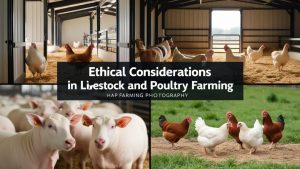Livestock and poultry farming play a critical role in global food production, providing meat, milk, eggs, and other animal products. However, ethical concerns have increasingly gained attention due to issues related to animal welfare, environmental sustainability, food safety, and labor rights. As consumer awareness grows, ethical farming practices are becoming essential to ensure responsible and humane treatment of animals while balancing economic and social needs.
This article explores the ethical considerations in livestock and poultry farming, addressing animal welfare, environmental responsibility, sustainable practices, food safety, and the role of policies and regulations in promoting ethical farming.
Click HERE to join our WhatsApp group chat
Animal Welfare and Humane Treatment
a) Housing and Living Conditions
Free-Range vs. Confined Systems: Ethical concerns arise regarding the space, ventilation, and overall comfort of farm animals.
Cage-Free and Enriched Housing: Many consumers advocate for alternatives to battery cages in poultry farming and gestation crates in pig farming.
Access to Natural Behaviors: Ethical farming promotes environments where animals can express natural behaviors, such as foraging and social interactions.
b) Pain and Suffering Reduction
Humane Slaughter Practices: The use of stunning before slaughter minimizes pain and distress.
Dehorning, Tail Docking, and Beak Trimming: These procedures are often performed for management reasons but should be done with pain relief or phased out when possible.
Genetic Selection for Fast Growth: Breeding for rapid growth in broilers and high milk yield in cows often leads to health issues, raising ethical concerns.
c) Health and Veterinary Care
Proper Medical Attention: Ethical farming includes access to veterinary care, vaccinations, and disease prevention programs.
Reducing Antibiotic Overuse: Overuse of antibiotics contributes to antimicrobial resistance, impacting both animal and human health.
READ ALSO: Role of Probiotics and Prebiotics in Animal Health
Environmental Responsibility

a) Pollution and Waste Management
Manure Management: Excessive waste can lead to water and soil contamination. Ethical farms implement waste recycling and composting.
Greenhouse Gas Emissions: Livestock farming contributes to methane emissions. Sustainable practices such as rotational grazing and feed additives help mitigate environmental impact.
b) Deforestation and Land Use
Intensive vs. Extensive Farming: Ethical considerations involve balancing land use with preserving biodiversity.
Sustainable Feed Sources: Ethical farmers prioritize locally sourced or alternative feed ingredients to reduce deforestation linked to soy and palm oil production.
c) Water and Energy Use
Efficient Water Management: Reducing water wastage through precision irrigation and recycling wastewater is an ethical priority.
Renewable Energy Adoption: The use of solar, wind, and biogas systems in farming reduces reliance on fossil fuels.
READ ALSO: Beef Cattle Farming: Breeds, Housing, and Management
Sustainable Farming Practices
a) Organic and Regenerative Agriculture
Chemical-Free Farming: Ethical farms minimize synthetic fertilizers and pesticides.
Regenerative Grazing: Restorative practices improve soil health, enhance biodiversity, and sequester carbon.
b) Local and Small-Scale Farming Support
Reducing Industrialized Farming Dominance: Ethical farming encourages support for small-scale farmers who implement humane and sustainable methods.
Community-Based Agriculture: Strengthening local food systems benefits economies and reduces the carbon footprint associated with food transportation.
Ethical Food Safety and Consumer Transparency
a) Honest Labeling and Traceability
Organic, Free-Range, and Grass-Fed Labels: Ethical considerations demand that such claims be backed by verified standards.
Animal Welfare Certifications: Programs like Certified Humane and Global Animal Partnership (GAP) ensure adherence to ethical practices.
Blockchain and Technology Use: Digital traceability enhances transparency in food sourcing and safety.
b) Ethical Meat Alternatives and Diet Choices
Plant-Based and Lab-Grown Meat: Ethical considerations extend to reducing reliance on traditional livestock farming.
Reducing Food Waste: Ethical consumption involves responsible purchasing and reducing waste in supply chains.
READ ALSO: Stress Management in Livestock
Labor Rights and Ethical Treatment of Workers
a) Fair Wages and Safe Working Conditions
Protecting Farm Workers: Ethical farming ensures fair wages, humane working hours, and safe conditions.
Eliminating Exploitative Labor: Addressing concerns over migrant worker exploitation in industrial farms.
b) Education and Training for Ethical Practices
Empowering Farmers with Knowledge: Ethical training ensures that best practices in animal welfare and environmental sustainability are followed.
Policies, Regulations, and Consumer Influence
a) Government and International Standards
Animal Welfare Laws: Countries are strengthening regulations to improve livestock living conditions.
Sustainable Farming Incentives: Policies promoting regenerative agriculture, carbon farming, and organic methods help drive ethical practices.
b) Role of Consumers and Advocacy Groups
Conscious Consumerism: Consumer demand for ethically produced meat, dairy, and eggs encourages industry change.
Activism and Public Awareness: Animal rights groups and ethical farming movements play a key role in shaping policies and industry practices.
Conclusion
Ethical livestock and poultry farming involve balancing animal welfare, environmental sustainability, food safety, and fair labor practices. As global awareness of ethical considerations grows, the farming industry must adopt humane and sustainable solutions to meet consumer expectations and regulatory requirements. By integrating ethical practices, farmers can create a more sustainable and responsible future for livestock production.
READ ALSO: Alternative Feed Ingredients and Their Benefits
Feed is the most significant cost in livestock and poultry farming, often accounting for 60-70% of total production expenses. Traditionally, commercial feeds rely on conventional ingredients such as corn, soybean meal, fishmeal, and wheat. However, rising feed costs, fluctuating availability, and environmental concerns have led researchers and farmers to explore alternative feed ingredients…
READ ALSO: Feed Processing and Preservation Techniques
Feed processing and preservation are essential for maintaining nutritional quality, preventing spoilage, and enhancing digestibility in livestock and poultry diets. Proper processing ensures efficient feed utilization, reduces wastage, and improves animal performance…
Click HERE to join our WhatsApp group chat